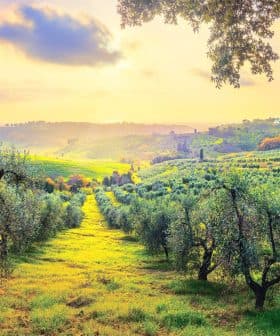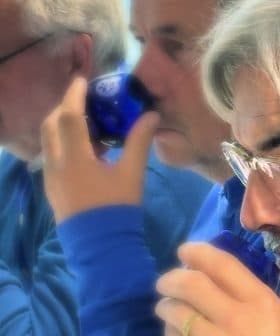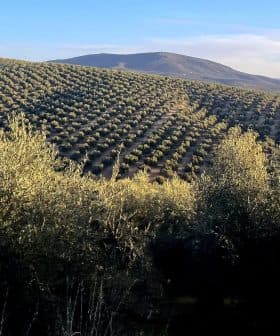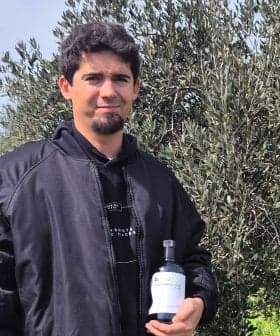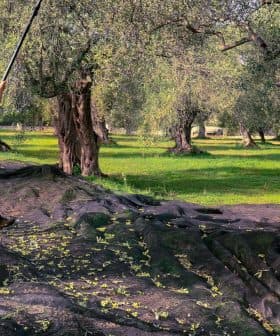28 Complete Sommelier Certification Program
Professionals and enthusiasts joined the growing network of certified olive oil sommeliers around the world after completing a comprehensive six-day program in New York.
 Becky Li analyzed a sample at the Olive Oil Siommelier Certification Program
Becky Li analyzed a sample at the Olive Oil Siommelier Certification ProgramTwenty eight olive oil professionals and enthusiasts completed the Olive Oil Sommelier Certification Program in New York City, focusing on a wide range of topics from olive oil quality assessment to health benefits. Attendees, including individuals from around the world, plan to share their knowledge with colleagues and implement what they learned in their respective fields, such as running pairing courses and improving production techniques. The course also provided opportunities for networking and tasting oils from around the world, with the next certification course scheduled for San Francisco in September.
Twenty eight olive oil professionals and enthusiasts have completed the six-day Olive Oil Sommelier Certification Program in New York City.
The eighth edition of the widely-acclaimed course focused on a wide array of topics from the assessment of olive oil quality and olive cultivation, harvesting and production to olive oil health benefits, chemistry and standards, among many other things.
There is not a single path when we talk about olive oil. There are many possibilities and the sum of visions and knowledge presented to the student can be applied in its own way.
The newly minted sommeliers, who hailed from all over the world and across the United States, will now take what they have learned back to their respective jobs and share their newly acquired knowledge with their friends, families and colleagues.
“It was an organized and passionate group,” Angela Rosenquist, the head of sales and a product developer at InnovAsian Cuisine, told Olive Oil Times. “I was amazed and impressed at how diverse the reasons were for students attending the course.”
See Also:Olive Oil EducationRosenquist, who came all the way from Stockton, California to attend, said that she will use her newly acquired knowledge to run pairing courses for her company’s products with different types of extra virgin olive oils and try to introduce tasting courses as well.
“My goal is providing frozen food a voice in the industry. I want the food to shine,” she said. “To a customer, the food is frozen and only the customer can unlock the freshness by cooking it.”
“It’s a cool concept to enhance a frozen meal with fresh herbs and extra virgin olive oil,” she added. “When you do, and are ready to serve it, which olive oil are you using to entice the flavor to the surface?”
To questions such as this one, Rosenquist found answers from the international panel of instructors.
Rosenquist also took the opportunity to network with her classmates and already has plans to visit some of them once everyone has returned home.
Arcangelo Rea is among the fellow sommeliers Rosenquist will visit. Rea produces olive oil at Queen Creek Olive Mill in Arizona and also came to New York in order to expand his base of knowledge around the product.
“I really enjoyed the course, I felt it was more educational than any course I have taken in the past,” he told Olive Oil Times. “My favorite part was getting the opportunity to meet and learn from some of the most influential people in the olive oil industry and, of course, to taste great olive oils from around the world.”
Rea said that he was surprised by some of what he learned, especially one of the instructor’s takes on filtration during the production process. He also plans to apply his knowledge starting with the next harvest season.
“This year when I am producing olive oil, I will implement the use of cellulose filtration plates,” Rea said. “Pablo Voitzuk convinced me that it is an indispensable practice to increase both the quality and shelf life of the olive oil.”
Panagiotis Magganus, a restaurateur and olive oil producer from Crete, in Greece, was another attendee at the program looking for way to improve his production techniques and share his newly acquired knowledge with fellow producers.
“I hope with the knowledge, which I took from the olive oil sommelier course, I will produce a high-quality extra virgin olive oil and teach other Cretan people how they can improve their cultivation and production techniques,” he told Olive Oil Times.
A common goal among the attendees of the course was learning how to differentiate between high-quality olive oil and bad olive oil in order to advise customers and clients on what they should be buying and consuming.
“We sell extra virgin olive oil in a country where knowledge of olive oil is limited,” Karrie Kimble, an importer at Philosophy Foods in New York, told Olive Oil Times. “We wanted to increase our knowledge to pass along to our chefs, retailers and distributors as well as expose our palates to oils outside of our Spanish competencies.”
Kimble said that she enjoyed the opportunity of sampling more than 100 samples from around the world.
“Unfortunately, there were more confirmations than surprises for me – mostly in how undertrained we were regarding oils from Italy and Greece,” she said. “The most helpful part of this course was tasting olives oils from around the world that were recently submitted for the NYIOOC World Olive Oil Competition.”
See Also:NYIOOC 2019Kimble will use her newly acquired knowledge to continue teaching current and new customers about olive oil and will also tour the country presenting and preparing foods with extra virgin olive oil.
Zi Xie, an Australian entrepreneur, told Olive Oil Times that she will also use what she learned from the course “to innovate tastings and events where people can educate and nourish themselves.”
Xie said she is quite passionate and interested in learning about olive oil, but especially enjoyed all the different perspectives that attendees brought from their particular jobs and homes.
“I enjoyed the course and really appreciated how well organized it was, and how it brought people from other fields of expertise together,” she said. “My favorite part was the people I met and the passion that was shared.”
Christian Vogt, an olive oil producer and owner of the Milonga Extra Virgin in the southern Brazilian state of Rio Grande do Sul, was another passionate attendee, who came to the course looking to expand his knowledge in order to help his business.
“With the course, I feel more confident in understanding the quality of my olive oil compared with the other oils in the market,” he told Olive Oil Times. “For me, the composition of instructors, all of whom came from different parts of the world, was very important. They were very competent and experienced with different opinions that enrich the knowledge.”
From these instructors, Vogt learned that every step of the olive oil production process, from the terroir to the milling, can be detected in a sensorial analysis of the resulting oil.
“It’s like seeing the whole year’s result of your orchard, processing and storage in a few seconds on your nose and in your mouth,” he said. “If you cannot create this link, you cannot find the best of your terroir.”
Like many of his fellow attendees, Vogt also enjoyed meeting and networking with the diverse array of people from different parts of the sector.
“There is not a single path when we talk about olive oil,” Vogt said. “There are many possibilities and the sum of visions and knowledge presented to the student can be applied in its own way.”
The next Olive Oil Sommelier Certification course will be held in San Francisco, California in September.







